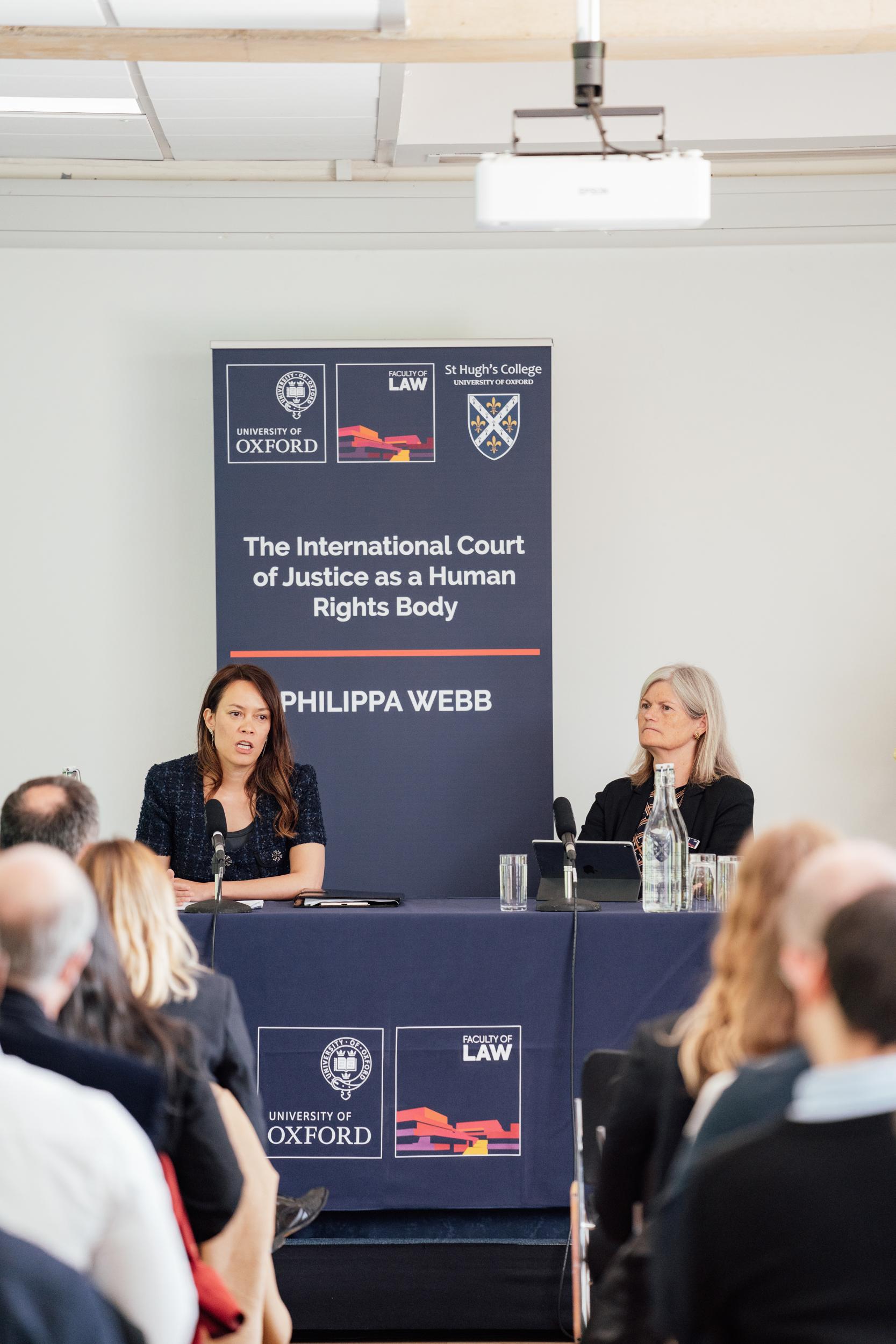Professors Philippa Webb and Kate O'Regan discuss 'The International Court of Justice as a Human Rights Body'
Associated people

On 15 May 2023, Oxford Law Faculty and St. Hugh’s College hosted a conversazione between Professor Philippa Webb (King’s College London, Twenty Essex Chambers) and Professor Kate O’Regan (Bonavero Institute of Human Rights) about whether the International Court of Justice should be viewed as a ‘human rights body’ in international law discourse.
The International Court of Justice (ICJ) is the principal judicial organ of the United Nations (UN).* The ‘World Court’, as it is also known, was established in 1945 under the UN Charter, with the ICJ Statute as its constitutional document.** The ICJ performs two roles: first, it settles (certain) legal disputes between States in accordance with international law (provided that the Court has jurisdiction); and second, it gives advisory opinions on legal questions referred to the Court by duly authorised UN bodies and agencies. The ICJ’s 15 judges sit at the Peace Palace in The Hague.***
So, is the ICJ a ‘human rights body’? Professor Webb explained that there is no formal definition of a ‘human rights body’ in international law, but a working definition can be proposed. She suggested that ‘a mechanism established by the international community (it may be a court, commission, committee, council etc) comprising experts who examine compliance with human rights with the goal of ensuring the implementation of international standards’ could be defined as a ‘human rights body’. Classic examples would be the judicial and quasi-judicial mechanisms established under treaties whose primary object and purpose is the protection of human rights. These include the UN Human Rights Committee and the European Court of Human Rights. The ICJ, though, has a distinct history, legal basis and ‘clientele’, compared with these institutions. Its foundation is the UN Charter, rather than a treaty setting out specific standards for human rights protection. It is limited in its contentious jurisdiction to resolving disputes between States, and those States must consent to come to the Court, either in advance or in respect of the specific dispute. Individuals cannot appear on their own behalf before the Court, even to make allegations of human rights violations. She noted that of the 300 treaties containing clauses giving the Court jurisdiction, only five are human rights treaties In this sense, the ICJ is very different from other international institutions which would attract the label of ‘human rights body’.
However, Professor Webb argued that there has been an evolution in the ICJ’s engagement with issues of human rights over time, such that the ICJ can now be classified as a ‘human rights body’. Quoting former ICJ Judge Bruno Simma, Professor Webb noted that the Court’s initial approach to human rights issues was marked by ‘hesitation and restraint’, but its more recent jurisprudence evidences a shift in approach.^ For example, the ICJ played an important role in recognising self-determination as a legal right.^^ The Court has also issued judgments and opinions concerning the prohibition of torture, the prohibition of genocide, and freedom from racial discrimination. In this way, the Court has engaged in what Simma described as the ‘juridical mainstreaming’ of human rights: bringing human rights into the fabric of general international law.^^^ Professor O’Regan suggested that the ICJ ought to be viewed as having a norm-setting role in the field of human rights. This would see part of the Court’s task as articulating standards for human rights protection, which could then cascade down to be applied by other institutions in the international and domestic legal systems. Professor Webb suggested that the development of human rights standards could be included in the working definition.
Finally, Professor Webb queried whether we are entering a new era in the ICJ’s engagement with human rights. ‘Crucial, even existential, issues are now coming before the Court,’ she posited. Professor O’Regan reflected that, in recent times, some of the most important geo-political issues – with evident human rights implications – have been put before the ICJ. Professor Webb noted an increasing concern in ICJ cases with collective rights and action, pointing to the unprecedented number of interventions under Article 63 of the Statute. Both referred by way of example to the case pending before the Court concerning the invasion of Ukraine, and to the recent request for an advisory opinion on States’ obligations in respect of climate change.^^^^ Concluding a fascinating discussion, Professor Webb argued that despite not being a ‘human rights body’ in the classic sense, the ICJ could fit the working definition and has on its docket some of the most pressing human rights issues of the day. It is, therefore, a body engaged with serious questions of human rights, and, case-by-case, its influence in the realm of human rights will only grow.
Reporting by Natasha Holcroft-Emmess: DPhil Candidate in the Faculty of Law, Research Director at the Oxford Human Rights Hub.
------------------------------------------------------------------------------------
Sources:
* https://www.icj-cij.org/frequently-asked-questions.
** https://www.icj-cij.org/history.
*** https://www.icj-cij.org/how-the-court-works; https://www.icj-cij.org/frequently-asked-questions.
^ See e.g. Legality of the Construction of a Wall in the Occupied Palestinian Territory (Advisory Opinion) [2004] ICJ Rep 136 [88].
^^ Bruno Simma, ‘Human Rights Before the International Court of Justice: Community Interest Coming to Life?’ in Tams and Sloan (eds) The Development of International Law by the International Court of Justice (OUP 2013), p. 303. See also Legal Consequences of the Separation of the Chagos Archipelago from Mauritius in 1965 (Advisory Opinion) [2019] ICJ Rep 95.
^^^ ibid, p. 323.
^^^^ Allegations of Genocide under the Convention on the Prevention and Punishment of the Crime of Genocide (Ukraine v Russian Federation) (Ukraine arguing that Russia making false claims of genocide as a pretext for the invasion of Ukraine violates the Genocide Convention): https://www.icj-cij.org/case/182; Obligations of States in respect of climate change (request for an Advisory Opinion): https://www.icj-cij.org/case/187.



